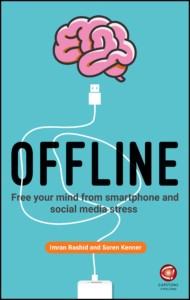Offline is a fascinating and important book co-written by a doctor and a marketer.
It explains how internet companies track us continuously; the sinister addiction-inducing marketing techniques used; and how our web activity is tracked and sold to third parties.
Do you, like me panic if you’ve left your phone at home? Why? Well, it’s not by chance. Companies invest a great deal to control your need – read on.
Offline explains human psychology, and how various websites utilise our brains’ release of dopamine – the pleasure/addiction hormone, to keep us returning repeatedly. On Facebook, we get messages and Likes – but we can never predict when – this craving-action-reward cycle releases dopamine and keeps us needing more. Stickiness is the buzz word.
Social media apps exploit our primeval socialisation need, and Offline explains how replacing actual with ‘fake’ digital socialisation can lead to depression and low self-esteem, and how these apps impair impulse control.
Facebook advertisers are able to select target groups – based on location, gender, age, interests, behaviour and many other attributes. Facebook continuously monitors our user activity to update this information. Hence why if you search for a product you then get numerous adverts for the same item.
Kosinski studied 87 million Facebook profiles, and found that analysing just 68 ‘likes’ could predict skin colour, sexual orientation and political affiliation. With a few more, intelligence level, religion, alcohol/drug use, home circumstances, personality, affinity, and behaviour could also be deduced. To do this study, he asked 270,000 consenting volunteer Facebook users to allow him access to their entire network – ie not just their own profiles, but those of their friends AND friends of friends. Thus he accessed 87 million Facebook accounts, mainly without the users’ knowledge or consent. Offline explains how Cambridge Analytica infamously also accessed Facebook profiles without permission – by piggybacking into Kosinski’s data. How many more companies did this before Facebook closed the loophole?
Offline demystifies cookies too. These collect data when someone visits a website – some track what websites you browse subsequently – and some share this with third parties, even providing your name and address on occasions.
Offline discusses other practices, such as ‘Zuckering’ –after the Facebook CEO – where you’re tricked into sharing more information publically than you intended.
It reveals that Google searches are not random, but are biased, based on previous web activity – this can distort reality, creating ‘confirmation bias’ (interpreting new information to confirm existing beliefs) and thus promote social intolerance and polarisation. Maybe we would rather decide ourselves what we see in searches? It leads to cognitive dissonance too – you’ll need to read the book to find out more.
Offline discusses the deleterious effects of social media on mental health – giving a balanced view, highlighting when studies are flawed or inconclusive.
Finally it advises how to protect ourselves. It stresses that the web has many benefits and with awareness and behaviour changes, we can minimise bad effects – I agree, but knowledge is key and this book is an excellent summary.
By Dr K Thompson, author of From Both Ends of the Stethoscope: Getting through breast cancer – by a doctor who knows
http://www.amazon.co.uk/dp/B01A7DM42Q
http://www.amazon.com/dp/B01A7DM42Q

